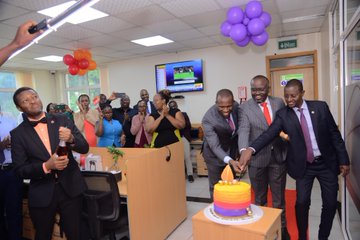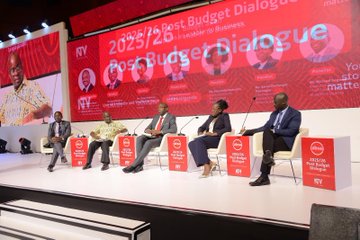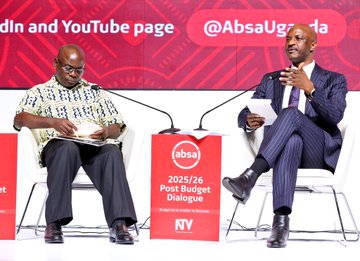Uganda is charting an ambitious path toward becoming a $500 billion economy, and it will take every citizen’s effort to make that dream a reality. This was the central message delivered by Ramathan Ggoobi, Permanent Secretary and Secretary to the Treasury (PSST), at the Absa-NTV Post-Budget Dialogue held Friday morning at the Serena Hotel in Kampala.
Addressing business leaders, economists, media executives, and policymakers at the annual forum themed “How Can the FY 2025/26 National Budget Best Enable Businesses?”, Ggoobi issued a passionate call to action.
“We are on a mission to change our destiny, and it’s in our hands. I want to mobilise every Ugandan to join this mission. We are tired of being a poor country — we can change ourselves,” he declared.
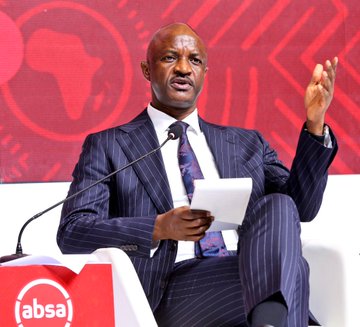
Five-Point Blueprint to Economic Transformation
Ggoobi outlined five core pillars critical to achieving Uganda’s economic vision: Clean Up – Enforce laws and eliminate corruption; Team Up – Promote consensus-building and teamwork; Skill Up – Equip Ugandans with market-relevant skills; Green Up – Embrace environmentally sustainable development; and Link Up – Integrate Uganda into regional and global value chains.
He emphasised that Uganda’s economic transformation is not constrained by a lack of resources but by how effectively those resources are managed. “Uganda is so richly endowed, it’s one of the few countries where you can survive without money. But we must look after ourselves. We can’t rely on taxpayers in other countries to meet our basic needs,” Ggoobi noted.
Budget Execution, Local Investment, and the Role of PDM
Ggoobi defended the Parish Development Model (PDM), describing it as a well-funded and well-structured tool for grassroots financial inclusion. However, he acknowledged challenges in aligning the program’s pillars to maximise impact.
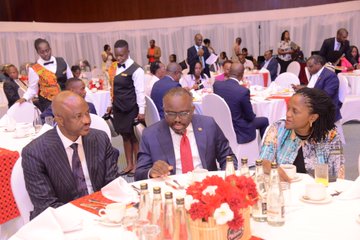
He also referenced the Teacher Effectiveness and Learner Achievement (TELA) system, a digital performance tracking tool now used in government schools to monitor teachers and improve education outcomes.
On attracting investment, Ggoobi highlighted Uganda’s partnership with the United Arab Emirates to build a 60,000-barrels-per-day oil refinery, calling it a “perfect fit” for Uganda’s energy market and a major step forward in national industrialisation.
A Dialogue Rooted in Realities
The forum brought together a wide range of voices from the public and private sectors. Susan Nsibirwa, Managing Director of Nation Media Group Uganda, opened the dialogue by reaffirming the media’s role in driving accountability and amplifying citizen voices.
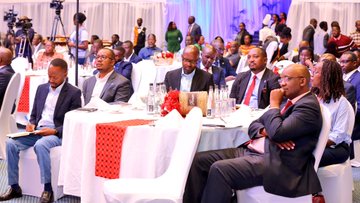
David Wandera, Managing Director at Absa Uganda, echoed the importance of listening to everyday Ugandans: “While numbers tell one side of the story, it’s the lived experience of entrepreneurs, exporters, and business owners that should guide our solutions,” Wandera said.
He noted that the 2025/26 budget must translate into jobs, cleared arrears, and new opportunities, especially in agriculture, manufacturing, and SME development.
Patronella Namubiru of Deloitte Uganda called for fairness in taxation: “Most people want to comply, but they want fair taxes. They don’t want to feel like they’re the only ones paying for everyone else.”
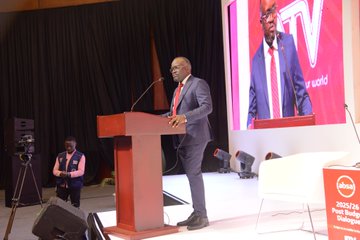
Meanwhile, URA’s Garry Kizito said the new budget includes targeted interventions to improve tax compliance, addressing long-standing challenges in collection.
Business Sector Welcomes Funding Boost
Allan Ssenyondwa from the Uganda Manufacturers Association welcomed the UGX 1.4 trillion earmarked for production and industry support. “One thing that has been limiting manufacturers is the low 54.5% capacity utilisation. This funding is a game-changer,” he said.
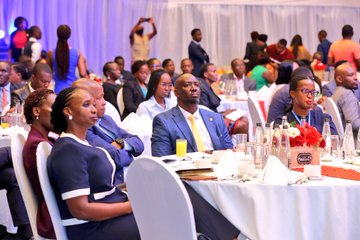
A New Chapter
As Uganda pushes forward with its development agenda, the post-budget dialogue offered more than just figures—it was a platform for honest reflection, collaborative solutions, and national ambition.
Ggoobi concluded by urging Ugandans to drop the “impossibility thesis” and instead focus on what is possible. “We need to start seeing the ‘possibility’ of this country. This mission is ours. It’s time to believe, act, and build the Uganda we want.”
